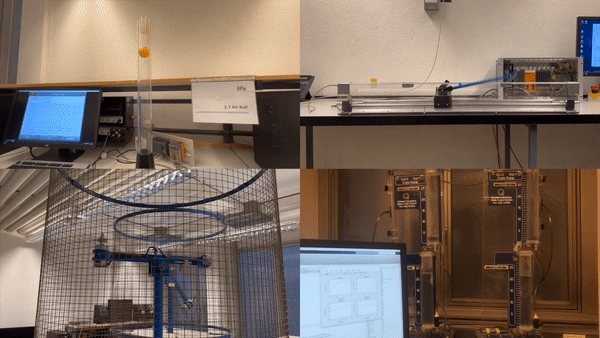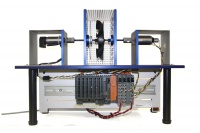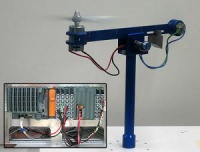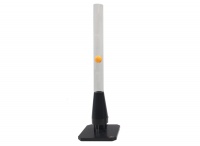Difference between revisions of "Experiments"
Akarapetyan (talk | contribs) |
|||
| (21 intermediate revisions by 3 users not shown) | |||
| Line 6: | Line 6: | ||
<br> | <br> | ||
<br> | <br> | ||
| − | + | [[File:FP_Overview.gif]] | |
| − | |||
| − | [[ | ||
<!-- | <!-- | ||
| Line 46: | Line 44: | ||
}} | }} | ||
--> | --> | ||
| − | |||
| − | |||
| − | |||
| − | |||
| − | |||
| − | |||
| − | |||
| − | |||
| − | |||
| − | |||
| − | |||
| − | |||
| − | |||
<!-- | <!-- | ||
| Line 75: | Line 60: | ||
--> | --> | ||
| − | + | <!-- | |
---- | ---- | ||
{{IfA_FP_Experiment | {{IfA_FP_Experiment | ||
| Line 90: | Line 75: | ||
|ExpFiles = [https://ethz.ch/content/dam/ethz/special-interest/mavt/dynamic-systems-n-control/idsc-dam/Lectures/Control-Lab/RangerStudent.pdf Manual] | |ExpFiles = [https://ethz.ch/content/dam/ethz/special-interest/mavt/dynamic-systems-n-control/idsc-dam/Lectures/Control-Lab/RangerStudent.pdf Manual] | ||
}} | }} | ||
| + | --> | ||
| + | <!-- | ||
| + | ---- | ||
| + | {{IfA_FP_Experiment | ||
| + | |ExpTitle = 1.4 Helicopter I - Fuzzy Logic | ||
| + | |PictureFile = Helicopter.jpg | ||
| + | |PictureDescription = Helicopter I - Fuzzy Logic | ||
| + | |ExpDescription = Use fuzzy logic to create a controller for a model helicopter. Take advantage of the human friendly, rule based technique to control any system that is difficult to describe mathematically. Ignore the internal structure of the model (Black Box), instead control the helicopter by only studying the behavior of the inputs and the outputs. Simulink will be used to develop the fuzzy controller. | ||
| + | |ExpPrerequisites = Basics of feedback control, in particular: | ||
| + | * The idea of feedback (RS1 §§ 4.1-3; weeks 3-4) | ||
| + | |ExpHomeworkDescription = Preparation time approx 1.5 hrs, see Manual. | ||
| + | |ExpFiles = [[media:IfA_1-4_manual.pdf|Manual]] | ||
| + | }} | ||
| + | --> | ||
| − | + | <!-- | |
---- | ---- | ||
{{IfA_FP_Experiment | {{IfA_FP_Experiment | ||
| Line 109: | Line 108: | ||
[https://ethz.ch/content/dam/ethz/special-interest/mavt/dynamic-systems-n-control/idsc-dam/Lectures/Control-Lab/Ball_on_Wheel.m Matlab Template] | [https://ethz.ch/content/dam/ethz/special-interest/mavt/dynamic-systems-n-control/idsc-dam/Lectures/Control-Lab/Ball_on_Wheel.m Matlab Template] | ||
}} | }} | ||
| + | --> | ||
| − | + | <!-- | |
---- | ---- | ||
{{IfA_FP_Experiment | {{IfA_FP_Experiment | ||
| Line 123: | Line 123: | ||
[[media:IfA_2-2_matlab.zip|Matlab Template]] | [[media:IfA_2-2_matlab.zip|Matlab Template]] | ||
}} | }} | ||
| − | + | --> | |
---- | ---- | ||
| Line 131: | Line 131: | ||
|PictureDescription = Speed Control - Ziegler-Nichols (PID) | |PictureDescription = Speed Control - Ziegler-Nichols (PID) | ||
|ExpDescription = Design and analyze a P-, PI- and PID controller for speed control of a DC motor drive. You will develop a model of the system in Matlab, which you can use afterwards to visualize step responses of the plant. The design of the controller follows the Ziegler-Nichols tuning rules. Validate the model by applying a reference step to both the model and the system. Since the control action is limited (i.e. the current you may feed to the motor), you will observe windup effects in the closed-loop systems. This is a very common situation for real plants. | |ExpDescription = Design and analyze a P-, PI- and PID controller for speed control of a DC motor drive. You will develop a model of the system in Matlab, which you can use afterwards to visualize step responses of the plant. The design of the controller follows the Ziegler-Nichols tuning rules. Validate the model by applying a reference step to both the model and the system. Since the control action is limited (i.e. the current you may feed to the motor), you will observe windup effects in the closed-loop systems. This is a very common situation for real plants. | ||
| − | |ExpPrerequisites = * Basics of PID control (RS1 §§ 4.4, 5; week 4) | + | |ExpPrerequisites = * Basics of PID control (RS1 §§ 4.4, 5; week 4). |
|ExpHomeworkDescription = Preparation time approx 1.5 hrs, see Manual. | |ExpHomeworkDescription = Preparation time approx 1.5 hrs, see Manual. | ||
| − | |ExpFiles = [[media: | + | |ExpFiles = [[media:Speed Control Manual 2023.pdf|Manual]] |
[[media:IfA_2-4_template.zip|Matlab Template]] | [[media:IfA_2-4_template.zip|Matlab Template]] | ||
}} | }} | ||
| − | |||
---- | ---- | ||
| Line 145: | Line 144: | ||
|PictureDescription = Helicopter II - Lead/Lag | |PictureDescription = Helicopter II - Lead/Lag | ||
|ExpDescription = You will control the two coupled axes of a helicopter model. First the model of the plant is calculated and then linearized. Using Matlab and Simulink, you will design a compensation controller (Lead/Lag), which can then be tested on the real system. | |ExpDescription = You will control the two coupled axes of a helicopter model. First the model of the plant is calculated and then linearized. Using Matlab and Simulink, you will design a compensation controller (Lead/Lag), which can then be tested on the real system. | ||
| − | |ExpPrerequisites = Lead/Lag Compensators | + | |ExpPrerequisites = Lead/Lag Compensators (as well as fundamentals of control including linear time-invariant control systems, e.g., "Control Systems I" at ETH Zurich). Please make sure you fulfill the prerequisites and come prepared (i.e., you have done the homework prior to the experiment session), such as to ensure you benefit from conducting the experiment. |
|ExpHomeworkDescription = Preparation time approx 2.5 hrs, see Manual. | |ExpHomeworkDescription = Preparation time approx 2.5 hrs, see Manual. | ||
| − | |ExpFiles = [[media: | + | |ExpFiles = [[media:IfA 2-6 manual.pdf|Manual]] |
[[media:IfA_2-6_matlab.zip|Matlab Template]] | [[media:IfA_2-6_matlab.zip|Matlab Template]] | ||
| Line 162: | Line 161: | ||
|ExpFiles = [[media:IfA_2-7_manual.pdf|Manual]] | |ExpFiles = [[media:IfA_2-7_manual.pdf|Manual]] | ||
}} | }} | ||
| − | |||
---- | ---- | ||
| Line 171: | Line 169: | ||
|ExpDescription = The quad-tank system is a relatively simple MIMO (multi-input, multi-output) system. MIMO systems are inherently more difficult to control than systems with only one input / output. | |ExpDescription = The quad-tank system is a relatively simple MIMO (multi-input, multi-output) system. MIMO systems are inherently more difficult to control than systems with only one input / output. | ||
In this experiment, you will learn some fundamental techniques to control a MIMO system, like coupled- and decoupled designs or LQR / LQG state-space controllers. | In this experiment, you will learn some fundamental techniques to control a MIMO system, like coupled- and decoupled designs or LQR / LQG state-space controllers. | ||
| − | |ExpPrerequisites = * Basics in MIMO control | + | |ExpPrerequisites = * Basics in MIMO control (E.g., ensure you are comfortable with the key learning's of a course such as "Control Systems I" at ETH Zurich). |
* Minimum/Non-minimum phase plants | * Minimum/Non-minimum phase plants | ||
* PI control | * PI control | ||
* LQR control | * LQR control | ||
| + | Please make sure you fulfill the prerequisites and come prepared (i.e., you have done the homework prior to the experiment session), such as to ensure you benefit from conducting the experiment. | ||
|ExpHomeworkDescription = Preparation time approx 2.5 hrs, see Manual. | |ExpHomeworkDescription = Preparation time approx 2.5 hrs, see Manual. | ||
|ExpFiles = [[media:IfA_3-4_manual.pdf|Manual]] | |ExpFiles = [[media:IfA_3-4_manual.pdf|Manual]] | ||
| + | |||
| + | [[media:Quad_tank_experiment.zip|Matlab and Arduino Template]] | ||
}} | }} | ||
---- | ---- | ||
</div> | </div> | ||
Latest revision as of 09:58, 20 November 2023
On this page you will find short descriptions of every experiment we offer. You can also download the manuals and necessary files for your homework preparation from here.
Registration: Please register for experiments on the D-ITET online registration website.

2.4 Speed Control - Ziegler-Nichols (PID)
Design and analyze a P-, PI- and PID controller for speed control of a DC motor drive. You will develop a model of the system in Matlab, which you can use afterwards to visualize step responses of the plant. The design of the controller follows the Ziegler-Nichols tuning rules. Validate the model by applying a reference step to both the model and the system. Since the control action is limited (i.e. the current you may feed to the motor), you will observe windup effects in the closed-loop systems. This is a very common situation for real plants.
Prerequisites
- Basics of PID control (RS1 §§ 4.4, 5; week 4).
Homework
Preparation time approx 1.5 hrs, see Manual.
Place
Downloads
2.6 Helicopter II - Lead/Lag
You will control the two coupled axes of a helicopter model. First the model of the plant is calculated and then linearized. Using Matlab and Simulink, you will design a compensation controller (Lead/Lag), which can then be tested on the real system.
Prerequisites
Lead/Lag Compensators (as well as fundamentals of control including linear time-invariant control systems, e.g., "Control Systems I" at ETH Zurich). Please make sure you fulfill the prerequisites and come prepared (i.e., you have done the homework prior to the experiment session), such as to ensure you benefit from conducting the experiment.
Homework
Preparation time approx 2.5 hrs, see Manual.
Place
Downloads
2.7 Air Ball
In this experiment the height of a ball suspended in an air tube will be controlled. A fan at the bottom of the tube causes upward airflow that pushes the ball up to counteract the downward force of gravity. The fan speed can be controlled to change the air stream velocity, causing a change in ball height. A PID controller will be designed to follow reference trajectories of the ball height and reject disturbances. You will learn the basics of PID control and understand the effects of changing the controller gains.
Prerequisites
- none
Homework
Preparation time approx 1 hrs, see Manual.
Place
Downloads
3.4 Quad Tank
The quad-tank system is a relatively simple MIMO (multi-input, multi-output) system. MIMO systems are inherently more difficult to control than systems with only one input / output. In this experiment, you will learn some fundamental techniques to control a MIMO system, like coupled- and decoupled designs or LQR / LQG state-space controllers.
Prerequisites
- Basics in MIMO control (E.g., ensure you are comfortable with the key learning's of a course such as "Control Systems I" at ETH Zurich).
- Minimum/Non-minimum phase plants
- PI control
- LQR control
Please make sure you fulfill the prerequisites and come prepared (i.e., you have done the homework prior to the experiment session), such as to ensure you benefit from conducting the experiment.
Homework
Preparation time approx 2.5 hrs, see Manual.



